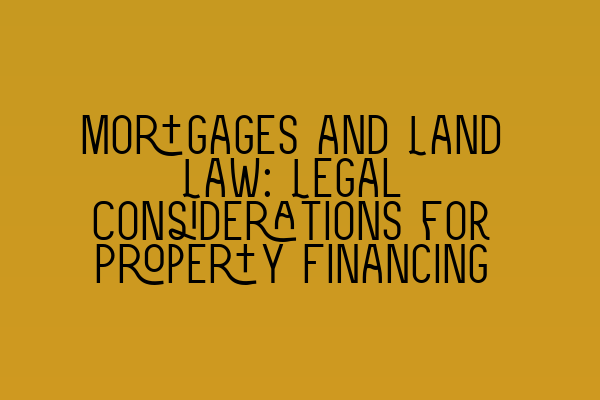Mortgages and Land Law: Legal Considerations for Property Financing
When it comes to financing a property, mortgages play a crucial role in helping individuals and businesses achieve their real estate goals. However, understanding the legal considerations surrounding mortgages and land law is imperative to ensure a smooth and secure financing process. In this article, we will delve into the key legal aspects to consider when dealing with mortgages in property transactions.
The Nature of Mortgages
In essence, a mortgage is a legal agreement between a borrower and a lender, where the borrower pledges a property as collateral in exchange for a loan. This agreement allows the lender to take possession of the property if the borrower defaults on the loan repayments. Mortgages offer a way for individuals and businesses to acquire and develop properties, presenting opportunities for growth and investment.
However, it is important to note that mortgages involve complex legal processes and require careful consideration to safeguard the interests of all parties involved. Understanding the legalities surrounding mortgages is essential for solicitors, potential borrowers, and lenders alike.
Mortgages and Land Law
Mortgage transactions are deeply intertwined with land law, making it crucial to have a firm grasp of the legal framework surrounding property ownership and rights. Land law encompasses a wide range of legal principles and regulations concerning property ownership, land use, and property rights, among other things.
One of the first steps in mortgage transactions is conducting a thorough examination of the property’s title and any encumbrances that may affect the mortgage. This examination involves scrutinizing the Land Registry records, land survey reports, and any other relevant documents. It is crucial to identify any potential obstacles that could affect the mortgage agreement.
Additionally, when drafting mortgage agreements, solicitors must ensure compliance with land law regulations, such as the need for written contracts, proper execution of deeds, and registration requirements. Failure to adhere to these regulations can lead to legal disputes and potentially invalidate the mortgage.
Legal Considerations for Borrowers
For individuals or businesses seeking mortgage financing, understanding the legal implications is vital. Borrowers should consult with a solicitor experienced in property law to navigate the complexities of mortgage transactions.
One key consideration is the terms and conditions of the mortgage agreement. Working with a solicitor will help borrowers negotiate favorable terms and ensure adequate protection of their rights. Understanding provisions such as interest rates, repayment schedules, penalties, and default remedies is critical in making informed decisions regarding the mortgage.
Furthermore, borrowers should also be aware of their responsibilities as property owners, such as the obligation to maintain the property and comply with local planning and zoning regulations. Violations of these obligations can impact the viability of the mortgage and lead to legal repercussions.
Legal Considerations for Lenders
Lenders, too, have legal considerations when it comes to mortgages. They must perform due diligence to assess the creditworthiness of borrowers and the value of the property offered as collateral. This involves conducting thorough property appraisals, reviewing the borrower’s financial history, and assessing their ability to repay the loan.
When drafting mortgage agreements, lenders must ensure that the terms are legally enforceable and provide adequate protection in the event of borrower default. It is crucial to work with a solicitor well-versed in land law to create a robust, legally sound document.
In the event of default, lenders must follow legal procedures to enforce their rights. These procedures vary depending on the jurisdiction, but typically involve providing notice to the borrower, initiating foreclosure proceedings, and potentially seeking court intervention to reclaim the property.
Conclusion
In summary, mortgages are essential instruments in property financing, but they require a deep understanding of land law to navigate successfully. Whether you are a borrower or a lender, consulting with a solicitor experienced in property law is crucial to ensure compliance with legal regulations and protect your rights.
At SQE Property Law & Land Law, our team of solicitors specializes in property transactions, including mortgages and land law. We provide comprehensive legal guidance tailored to our clients’ specific needs. Contact us today to ensure a smooth and secure property financing process.
Related Articles:
